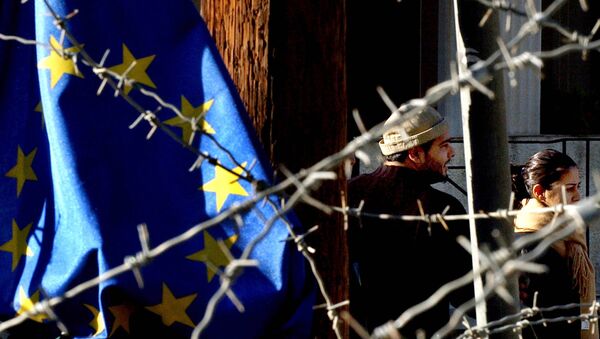The key to success in the Cyprus talks is to abandon the "principle of competition" for the sake of compromise, Dr. Ahmet Sozen of Eastern Mediterranean University (EMU) believes.
Speaking to Sputnik Turkiye the academic underscored that if the parties concerned demonstrate political will, they may reach an agreement on resolving the Cyprus reunification dispute "within days."
The Cyprus Republic became divided back in 1974. An attempted coup d'état organized by Greek Cypriot nationalists which sought to reunify with Greece prompted the Turkish military invasion of the island. As a result the so-called Turkish Republic of Northern Cyprus was established. The entity was recognized only by Turkey, while the international community condemned the move.
In accordance with international law the Cyprus Republic is de jure a sovereign state and a member of the European Union. De facto, the country is divided into four parts: the self-declared Republic of Northern Cyprus, the Greek-dominated Cyprus Republic, the UN buffer zone and Britain's Sovereign Base Areas (SBA) of Akrotiri and Dhekelia.
After a series of futile attempts to reach a compromise on the Republic's reunification the negotiations were resumed in February 2014. Still, in November 2016, they broke up because of difference of opinions on territorial issues.
Last Friday President of Cyprus Nicos Anastasiades signaled that "there are some signs" of progress in the decades-long dispute.
"For the first time, Turkey is actively participating in the discussion on security issues and guarantees. We are actually at the very beginning of the dialogue," Anastasiades told a press conference.
"Since there are signs that the dialogue continues, I hope for the Geneva conference decisions. We have chosen the path that leads to hope. If we reach an admissible agreement, the conference will result in some decision," he said.
According to Sozen, the Cyprus talks include such issues as the system of management, the separation of powers, the economy, relations with the EU, the territorial issue and security.
"The leaders have managed to achieve significant progress on the first three issues," the academic stressed.
However, the thorny security question remains the Gordian knot to be cut.
Sozen believes that the parties concerned will be able to work out a mutually beneficial solution.
"I was not surprised that after the recent round of negotiations we have yet to see the full text of the agreement, because these issues require scrupulous attention. The approach toward the matter of security should satisfy Turkey, Greece and the United Kingdom — the three guarantor countries," he emphasized.
For their part, Turkish Cypriots should demonstrate more flexibility in discussing territorial and property matters, the academic insists.
Sozen noted that Anastasiades and Akinci are "very close" to solving the first five issues.
He believes that having reached a compromise on these matters Greek Cypriots and Turkish Cypriots may place the burden of solving the island's thorny security problem on the guarantor powers.
The academic explained that the new security system should be adapted to the current international environment.
"It is necessary to create a system capable of resisting [modern] threats through wide security architecture," he noted.
He believes that if the parties show enough flexibility and political will, "they will be able to reach an agreement within a few days."
In contrast to Sozen, Andreas Theophanous, Professor of Political Economy and President of the Center for European and International Affairs, University of Nicosia, believes that the negotiations will take far more time.
According to Theophanous, the reunification of Cyprus requires an evolutionary approach. He insists that the two communities need time for gradual strengthening of relations and formation of an indivisible state.
"I think it's been very hasty," Theophanous told Sputnik commenting on the latest round of talks.
"When it was decided in December 2016 to meet in Geneva, there were serious differences between the two sides," he stressed.
The Cyprus talks are due to continue on January, 18.




